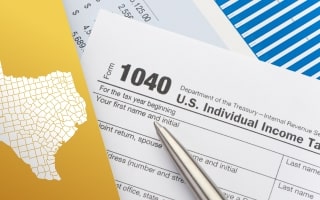Property Tax Records in Texas

Texas is one of a small number of states that don't collect property taxes from residents. However, each district in a county can still set rates and collect taxes every year. The taxes that homeowners pay cover everything from schools to police enforcement. The average property tax bill for a homeowner in Texas is just under $3,800 per year. In Texas, homeowners pay an average effective tax rate of 1.60%, which is among the highest in the country.
The amount of tax you end up paying depends on the total value of your home and the effective tax rate in your county. Homes are always appraised by local assessors at the start of the year. Your appraisal can also be appealed and reviewed in May. You should receive your annual tax bill at the beginning of October. In most counties, these bills are due at the end of January.
While the appraisal of your home is carried out by a local assessor, this process is overseen by the appraisal district that you live in. They also issue tax bills and collect revenue for the county. Since local governments are tasked with setting tax rates, they can vary considerably from county to county. However, Texas law requires the property values that are used to determine taxes to be uniform and equal.
In the century after Texas became a state in 1845, property taxes were collected at all levels of government. The state also used these revenues to cover some of its annual budget. Over the years, however, it became clear that properties were being undervalued and that state laws were too decentralized to support the collection of property taxes. Texas abolished all state property taxation in 1983.
Property Tax Assessment in Texas

As mentioned previously, property taxation in Texas must be uniform and equal. While the state doesn't collect any taxes, there are still some laws that counties must adhere to, ensuring that all property owners are treated fairly and equitably in the assessment process.
The tax rate on your property is based on its fair market value. Each appraisal district assesses property values every year. The local chief appraiser is chosen and hired by the appraisal district board of directors.
While your property taxes in Texas can change every year, they likely won't increase or decrease at a high rate. Once the assessor in your county identifies the fair market value of your property, they will determine the taxable value. No matter where you live, the taxable value is 100% of the market value.
If your home has a market value of $300,000, the assessed value will be the same. You can then calculate your property taxes for the year by multiplying the taxable value by your county's tax rate. If the tax rate in your county is 1.5%, your annual property taxes will be $4,500. The tax rates in the most populous Texas counties are:
- Harris County: 2.13%
- Dallas County: 2.22%
- Tarrant County: 2.26%
- Bexar County: 2.35%
- Travis County: 1.95%
Property taxes in Texas don't vary much from county to county. Even in more rural parts of Texas, taxes are high when it comes to real estate.
Calculate Texas Taxes
A Texas property tax calculator is a valuable resource for homeowners and real estate investors seeking to better understand how property taxes are calculated across the state. This tool allows users to enter important details, such as county, school district, property value, and applicable exemptions, to estimate their annual property tax assessment and liability. Since Texas does not have a state income tax and relies heavily on property taxes to fund local services, tax rates can vary significantly between counties, cities, and school districts, making the calculator especially useful for generating location-specific estimates.
In addition to estimating your property taxes, a Texas property tax calculator can also help identify available exemptions and tax relief programs. The state offers several key exemptions, including the General Residence Homestead Exemption, which reduces a portion of the appraised value of your primary residence, and additional exemptions for seniors, disabled individuals, and veterans. Some school districts, cities, and counties may also offer optional percentage-based exemptions. Using the calculator can help ensure you're not missing out on any tax savings opportunities and give you a clearer picture of your overall tax obligations.
using our property tax calculator.
Texas Property Tax Records: What Are They?

The county you live in collects property taxes to pay for things like schools, streets, roads, police, fire protection, and other local public services. However, the amount that's collected depends on the tax rate. Taxing districts can make changes to the rates they charge based on their annual revenue needs.
Property tax records in Texas are documents and electronic information about each property, its tax rate, and other details. These documents are public records, and anyone can perform a Texas property tax search with the right tools, making it easy for individuals to access important information about property ownership and tax obligations.
Tax records often contain information about the latest tax payments as well as relevant details about the property. The data contained in Texas property records is linked to each property and homeowner. Some of what you will find on these records include the following:
-
Property address and description
-
Property owner's name and address
-
Lot size
-
Building size
-
Land value
-
Building value
-
Tax rate (per thousand)
-
Class (residential/commercial/industrial)
-
Map/parcel number
-
Book/page numbers
-
Deed date
-
Real estate taxes
-
Credits and interest
-
Taxing units
-
Improvement details
Property tax records in Texas show the property's appraised value and how much tax is required to own it. Before buying any real estate, knowing what you are getting into is essential. Tax rates can make the difference between being able to afford a property or not. These records also chronicle historical owners and how the tax rate has changed over time.
Property Tax Exemptions and Deductions in Texas

Homeowners in Texas can take advantage of some tax exemptions or deductions. If you're able to qualify for an exemption, it will reduce the taxable value of your home. Let's say that you qualify for a $40,000 exemption on a $300,000 home. Once the exemption is applied, the new taxable value of your home will be $260,000. Here's a closer look at the numerous exemptions and deductions Texas residents have access to.
Homestead Exemption: The most common exemption is the homestead one, where the school district in your area must provide an exemption of up to $100,000. Before 2024, the exemption only amounted to $40,000. You must register your property as a homestead to qualify.
Senior and Disabled Exemptions: Texas also offers disabled veterans a 100% tax exemption if they receive 100% of their disability compensation from a service-related incident. Veteran spouses can also apply for this exemption.
Anyone who is 65 or older is obligated to file for a senior tax exemption. They will receive at least $3,000 and up to $10,000 of residence homestead exemption.
Other Property Tax Deductions: Some other uncommon property tax deductions include one for homes with a solar or wind-powered energy device installed.
A surviving spouse of a first responder killed or fatally injured in the line of duty is also entitled to a total tax exemption on their residence as long as they have not remarried.
How To Search Property Tax Records in Texas

Property tax records in Texas are created, stored, and maintained by the local appraisal district office. That is the official source for property tax records throughout the state. However, you can also find Texas property records in other ways.
Along with visiting the local appraisal district office in your area, you can also visit online property tax databases. Some counties have this information posted online on their website.
For example, the Harris County Appraisal District has a tool ( HCAD property search) on its website where you can search for property tax records. Others even offer a property tax calculator in TX.
Since property tax records are publicly available, you can also use commercial websites like PropertyChecker to find property tax records and related information nationwide 24/7. Property tax records in Texas reveal a lot of information, including the lot size, tax rate, and annual taxes. The types of records you'll gain access to with a search on PropertyChecker.com include the following:
-
Property details, such as number of bedrooms and bathrooms
-
Deed records
-
Lien records
-
Loan information
-
Owner names
-
Neighborhood information
-
Foreclosure details
-
Building permits
-
Property Values
-
Property tax records
-
Sales history
Each year, the appraisal district assesses property values and attaches information about how they derived the tax rate. A typical Texas property assessment will include property ownership information such as name, address, and contact details.
The property tax records will also show a tax payment history and if the owners ever defaulted on payments. You could find out if the district imposed a Texas tax lien or foreclosed on the property. The records will show the assessment history and how the property values have changed over time (decreased/increased).
How To Appeal Property Taxes in Texas

You can appeal if your taxes are too high because the district appraised your home at a higher than fair market value. You must have proper grounds for appealing, such as evidence that the appraisal is too high. Each district has an appraisal review board (ARB), which is made up of regular local citizens. They are responsible for fielding any disputes and appeals regarding property taxes.
Step 1: To file an appeal, you must obtain a Notice of Appeal from the Property Owner (and provide it to the appraisal district's chief appraiser). The ARB will mediate between the two parties and review all evidence before deciding.
Come prepared with an independent appraisal or other documentation to prove your claim. After you receive the appraisal district notice that tells you the value of your home, you'll have 30 days to appeal.
Step 2: You should get a written order of the ARB's decision in the mail a couple of weeks after the hearing. If you aren't satisfied with the findings, you can appeal the decision to the district court in your county. You have 60 days to file the appeal.
Step 3: If you'd like to bypass the district court appeal, you can appeal through Regular Binding Arbitration, which is available for homestead properties.
How Property Taxes Impact Real Estate Transactions in Texas

Property tax rates vary quite a bit by location. Before buying real estate in Texas, it is essential to consider the taxes and whether or not you can afford the home. Research the property online to find out if it has any tax liens or is in foreclosure. Sometimes, buying homes in foreclosure can be a great deal, or it can complicate the sale.
Since Texas property taxes are among the highest in the country, they often play a role in real estate transactions. If a buyer is tasked with paying $5,000 in annual property taxes, they may discover that they can't afford the home. Sellers who live in counties with tax rates above 2% must be cautious about pricing their properties too high.
Investors need to also consider property taxes before buying rentals. Buying a home with high property taxes can make it more challenging to earn profits from tenants. Investors and buyers often access property tax records when performing due diligence on the pieces of real estate they wish to buy.
In Texas, investors are commonly involved in property tax sales. When homeowners get behind on their property taxes, the local government has the right to seize and sell the property at foreclosure. The first step is placing a tax lien on the property.
Property tax liens in Texas must be resolved before the property can be sold. If the district forecloses, they will sell the property for the overdue tax amount at auction. Then, the new owner can sell it for a profit, often making it a lucrative opportunity for investors who are willing to navigate the foreclosure process.
Real estate investors often Tax lien auctions in Texas because they may find a great place in good condition, but the homeowners are struggling to keep up with payments. They can often pick up properties cheap (for the price of the overdue taxes, interest, and fees) rather than at fair market value. Then, they can sell the property for profit.
Investing in real estate in Texas takes some research, and knowing what you are getting is essential. If the home is in foreclosure only because the homeowners cannot afford the taxes, it could be a great deal. However, there could be other issues, so always do your homework.
Before buying a tax lien property in Texas, you must resolve the overdue tax payments. Once you pay those, the district will sign the deed over to you, and you can evict the homeowners and sell the property. Each county may have a tax delinquent list in Texas. Tax lien auctions in Texas may be listed on realty sites or other specialty resources.
Free Texas Property Tax Lookup
Tax Records Please wait...
Property Tax Guide
Instant Access to Texas Property Records
- Owner(s)
- Deed Records
- Loans & Liens
- Values
- Taxes
- Building Permits
- Purchase History
- Property Details
- And More!
Free Texas Property Tax Lookup
Tax Records Please wait...